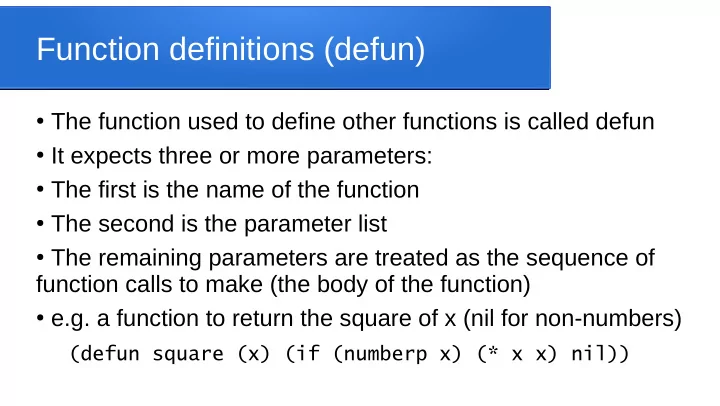

Function definitions (defun) ● The function used to define other functions is called defun ● It expects three or more parameters: ● The first is the name of the function ● The second is the parameter list ● The remaining parameters are treated as the sequence of function calls to make (the body of the function) ● e.g. a function to return the square of x (nil for non-numbers) (defun square (x) (if (numberp x) (* x x) nil))
Documentation strings ● It is common to make the first statement in a function simply a string, like a one-line help, e.g. (defun foo (x) “foo just returns whatever you passed to it” x) ● To look up the documentation string for a function: (documentation ‘foo ‘function)
Multiple statements in a function ● Not “pure” f.p., but if a function body consists of multiple statements it will execute each in sequence, then the function returns the value of the last statement run (defun multByUserValue (x) “gets a value from the user & return that * x” (format t “Enter a number: “) (* x (read)))
Type checking on parameters In a function one of the first things we typically do is check the passed parameters were actually of the right types (defun intpow (x y) “returns x^y if both are integers, otherwise nil” (cond ((not (integerp x)) nil) ((not (integerp y)) nil (t (expt x y))))
Setf and defvar inside a function ● Variables declared with defvar are not local to the function, don’t use it inside a function (we’ll look at local vars using let blocks) ● Remember that if you use setf on an undeclared variable it acts like a defvar ● If you use setf on a parameter then it changes the local value of the parameter (generally ok, as long as that’s what you meant to do of course)
Local variables using let blocks ● Let blocks let us define and initialize a set of local variables, and use them within a sequence of lisp statements ● Let is still just a function, its return value is the value returned by the last statement in the block (let ((a 5) (b “foo”)) ; list of local vars, a=1, b=”foo” (format t “b is ~A~%”) ; first statement prints “b is foo” (* a a)) ; last statement returns 25 ● can be used anyplace a lisp function call can be made
Typical function layout 1 st line is documentation string, rest of body is a let block with local vars, body of let is a cond, starts with error checking (defun foo (a b c) “foo does stuff” (let ((answer 42) (why “ Y!”)) (cond ((equal a b) c) (t nil))))
Other options coming later ● special: for dynamically scoped variables ● &optional: to give default values to optional parameters ● &rest: to allow any number of parameters to be passed and processed ● &key: to allow keyword parameter passing instead of positional ● Values: allows a function to return multiple values (and nth- value to capture specific ones)
Recommend
More recommend